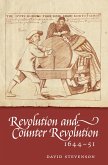Revolution and Counter-Revolution; Or, Germany in 1848 is a compelling anthology that captures the turbulent period of mid-19th century Germany through a mosaic of revolutionary ideas and counteracting forces. This collection illuminates the diverse literary styles used to chronicle the fervor of rebellion, juxtaposed with the ebb of reactionary forces. Within its pages lie a rich tapestry of political commentary and philosophical reflections, representing a profound dialogue between the aspirations of revolutionaries and the resistance of the old regime. The anthology as a whole showcases not only the intensity and fervor of its time but also provides enduring insights into the broader struggle for societal change. This anthology features the towering intellectual giants Karl Marx and Friedrich Engels, whose seminal works laid the foundation for modern socio-political thought. Their contributions in analyzing the events of 1848 offer a deep dive into the dynamics of class struggle, revolution, and political upheaval. Together, their writings help articulate the core tenets of Marxist theory and offer a critical lens through which to view the socio-political landscape of the 19th century. Immersed in the cultural and historical context of the era, these authors provide a comprehensive exploration of the dramatic shifts that shaped the German and European political scene. Revolution and Counter-Revolution is an essential read for anyone seeking a nuanced understanding of revolutionary movements and the forces that oppose them. It presents a unique opportunity to explore diverse perspectives within a single volume, where readers can engage with intellectual discourse and historical analysis. The anthology serves not only as an educational resource but also as a source of profound reflection and inspiration for the ongoing dialogue between revolutionary ideals and pragmatic realities. This collection invites readers to immerse themselves in the blend of theory, historical narrative, and political fervor that is still relevant today.
Dieser Download kann aus rechtlichen Gründen nur mit Rechnungsadresse in A, B, BG, CY, CZ, D, DK, EW, E, FIN, F, GR, H, IRL, I, LT, L, LR, M, NL, PL, P, R, S, SLO, SK ausgeliefert werden.









